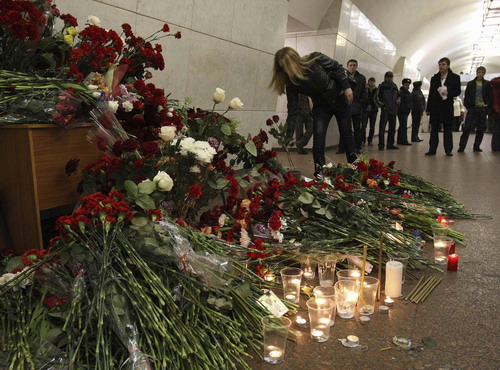Global General
Death toll of Moscow subway blasts hits 39
(Xinhua)
Updated: 2010-03-30 16:40
 |
Large Medium Small |
MOSCOW - A severely injured woman died in hospital, bringing the death toll of Monday's metro twin blasts up to 39, a Russian health official said Tuesday.
|
 Flowers left in memory of victims of the bomb explosion are seen at the Lubyanka metro station in Moscow March 30, 2010. Two female suicide bombers killed at least 38 people on packed Moscow metro trains on Monday, stirring fears of a broader campaign in Russia's heartland by Islamists from the North Caucasus. The blasts took place at Lubyanka and Park Kultury metro stations. [Agencies] |
"One critically injured woman died in Sklifosovsky Hospital overnight," Andrei Seltsovsky, head of the Moscow Health Department, told national television.
The blasts were confirmed to have been set off by two female suicide bombers who probably were linked to terrorist groups in the North Caucasus.
Russian Prosecutor General's Office called for help from eyewitnesses of the explosions in investigations, the RIA Novosti news agency reported.
"All evidence and any information about the terrorist attacks provided by witnesses are important for the investigation," said the office's investigative committee in a statement.
According to the influential Russian daily Kommersant, the two female suicide bombers were possibly related to the gang of Alexander Tikhomirov, or Said Buryatsky, a late militant leader in North Caucasus.
Buryatsky, who was killed earlier this month during a special operation, was reportedly linked to last November's train derailment and was notorious for preparing suicide attacks, said the newspaper.
Investigators were searching for two women and one man who accompanied the two female suicide bombers.
Local TV showed people in grievance voluntarily gathered around the two metro stations on Tuesday morning, laying flowers on the ground, as the capital city marked a day of mourning for the victims.











